august - july 2010
August 29th


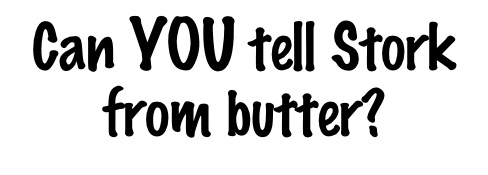
August 26th
Edwin Morgan’s funeral today, with hundreds present. Tributes and readings of his poems by poets who were close friends including David Kinloch and Liz Lochhead, the latter whose reading of the great poem "Cinquevalli" was the most fitting valediction.
Different people will take from his large output different things. No synoptic summation attempted: just my own few words as they strike me today. To me he left his own epitaphs, almost cheekily (in the displaced manner of Carlos Williams’s “Danse Russe” to the power hundred) in that poem “Cinquevalli”, and in the poem about the jigsawmaker in the suite “Poems from the Video Box”—which suite has some of the poems I happen to admire, indeed delight in, most. His best poems seem to me to as light, brilliant and sometimes as zanily funny as some judgements on his output and “the position of poetry in Scotland” etc can seem overly if predictably lugubrious: flags planted on a cairn for empire builders to spend the rest of their lives adding critical chuckies of their own making; others, as always in the case of poetry, wanting to meld bonds between classroom, poetry and a pompous notion of state.
Pompous and lugubrious Edwin Morgan was not, and his best work will like all art that stubbornly remains alive, continue to evade the bearers of syringes of critical formaldehyde. He was a lifelong translator and reader of European contemporaries; this with none of that commonplace mark-out-of-ten fingerwagging about necessary “internationalism”—that Calvinistic small-country parochialism ever worrying, in one form or another, about “our” need to be understood and seen-to-have-dignity, by folk abroad; who by definition unlike us are “international”.
He was a self-challenger into “feats” of language and a lantern-slideshow man, with a few of the more wellmarketed slides having enough of sincere liberal-social moralising to be thought useful to the Scottish Education Department, whom god preserve. His work throughout was anti-Calvinist, absolutely materialist, resolutely in fact increasingly chirpy. He was anti-existential, like MacDiarmid impatient with what he saw as the ontological “fuss” of the likes of Kierkegaard, instead seeing proper action, and “courage” in the naming-of-all-things. His sense of fun and absurdity that could attack such naming from within could save it from such as MacDiarmid’s sometime insistently hectoring sense of his own colonising importance.
He was a brilliant reader of his own work, and I never saw him give a duff reading ever. His was the name that for years would first come to mind to myself and others when organising a poetry reading in Scotland. His voice won’t be heard any more in the flesh reading that work. It will remain in my own mind whenever any of his poetry is before my eyes.
August 23rd
Mother Courage and her Children. Brecht’s Hamburg was, like Glasgow, a north European working-class port city. The architecture of the language would have similarities, just as the buildings. When I see photographs of the bombed Hamburg and Dresden, I know what Glasgow would look like if it were ever to be subject to mass bombing.
My Mother Courage is a Scottish woman, from the west of the country. She is the only definitely Scottish speaker, the theatre company, which specialises in disabled actors, can only say just now that she will be Scottish, where the rest will be from I don’t know. This is the song that finishes the play, syllabic count here as per the German for the Paul Desslau music:
Wi aw its dangers an stray bullets
this war drags on from day to day
the war could last a hundred years yet
yer common sojer willny win.
pure crap his food, his gear his rucksack
the regiment docks hauf his pay
an though it might strike you a wonder
this war will never go away!
It’s springtime noo! move on your way
the snaw’s aw gone. the deid lie deid
but you that huvny died as yet
the powers that be, they still do need.
I have tried as in Brecht to let “the speech reflect social status”. That is meat and drink to me, in this land where diction is an index of class, what I have been banging on about for long enough. It is a socialist play, it is not “feisty woman and the-pity-of-war” which would be the current “post socialist” mode a la new labour et al, diversity the shibboleth etc. The play's language, the 1960 Heinemann Educational edition of the text in German says in its English introduction, does not obey the rules of “correct grammar”, coming often from the “uneducated” and the “common” folk. Meat and drink, again. My own classroom Approach to Standard English in those days told me I should avoid Scots words, slang “and other solecisms”.
Mother Courage’s child’s lullaby sung over her dead daughter in the last act goes thus:
hushaby ma dearie
nestlin’ in the hay
neighbours’ weans are girnin
oors jist run an play
neighbours weans are clatty
oors are clean an neat
lookin like an angel
sae sweet.
neighbours weans go starvin
oors have cake aw day
an if their cake’s too crumbly
aw they need is say
hushaby ma dearie
nestlin in the hay
I’ve wan lay doon in Poland
the other’s faur away.
The German “greinen” for whining etc corresponds to the Scottish “girnin”. I came to the conclusion early that the true hero of the play is the language. And it is an anti-hero. Only dumb Kattrin can act outside it, only she can be a “hero” in the human sense.
A publisher in the north of England has asked to see my translation with a view to publishing it in 2012. Birds of Paradise will tour the play February – March 2011, finishing in the Tron in Glasgow.
August 17th

August 15th
My favourite war poem, written in 1796.
After Blenheim
It was a summer evening,
Old Kaspar’s work was done,
And he before his cottage door
Was sitting in the sun;
And by him sported on the green
His little grandchild Wilhelmine.
She saw her brother Peterkin
Roll something large and round
Which he beside the rivulet
In playing there had found;
He came to ask what he had found
That was so large and smooth and round.
Old Kaspar took it from the boy
Who stood expectant by;
And then the old man shook his head,
And with a natural sigh
‘’Tis some poor fellow’s skull,’ said he.
‘Who fell in the great victory.
‘I find them in the garden,
For there’s many here about;
And often when I go to plough
The ploughshare turns them out.
For many thousand men,’ said he,
‘Were slain in that great victory.’
‘Now tell us what ’twas all about,’
Young Peterkin he cries;
And little Wilhelmine looks up
With wonder-waiting eyes;
‘Now tell us all about the war,
And what they fought each other for.’
‘It was the English,’ Kaspar cried,
‘Who put the French to rout;
But what they fought each other for
I could not well make out.
But everybody said,’ quoth he,
‘That ’twas a famous victory.
‘My father lived at Blenheim then,
Yon little stream hard by;
They burnt his dwelling to the ground,
And he was forced to fly:
So with his wife and child he fled,
Nor had he where to rest his head.
‘With fire and sword the country round
Was wasted far and wide,
And many a childing mother then
And newborn baby died:
But things like that, you know, must be
At every famous victory.
‘They say it was a shocking sight
After the field was won;
For many thousand bodies here
Lay rotting in the sun:
But things like that, you know, must be
After a famous victory.
‘Great praise the Duke of Marlbro’ won
And our good Prince Eugene;’
‘Why ’twas a very wicked thing!’
Said little Wilhelmine;
‘Nay . . nay . . my little girl,’ quoth he,
It was a famous victory.
‘And every body praised the Duke
Who this great fight did win.’
‘But what good came of it at last?’
Quoth little Peterkin:—
‘Why that I cannot tell,’ said he,
‘But ’twas a famous victory.’
Robert Southey (1774 - 1843)
August 7th
I will be giving a reading at WordPower bookshop in West Nicolson Street Edinburgh this coming Wednesday October 11th at 1pm. The reading launches the bookshop’s Edinburgh Book Fringe season, the full programme for which can be seen here.
Amongst other stuff I intend to read some extracts from my ongoing new translation of Brecht’s Mother Courage and her Children .
August 6th
A survey of the artwork of Alasdair Gray will be published later this year under the title A Life in Pictures. Most of the work is available to look at online at a great webpage here. It can take a little while to load. The webpage goes right back to 1951 and the fine The Cardplayers, right up to 2010. You click on the title of a work then on the thumbnail picture that comes up; then on this new larger picture click a further "larger image" box top left to get the picture big as possible. I mention all this as I didn't notice the last stage myself at first, and it's important to give you a really good look at the work.
There are many people who will have drawings by Alasdair Gray that he did informally, at home or in a restaurant or wherever. In 1981 he looked after our two young children while my wife and I went to the cinema one evening. He drew on a sheet of brown wrapping paper we had in the kitchen, and here it is now on our wall.
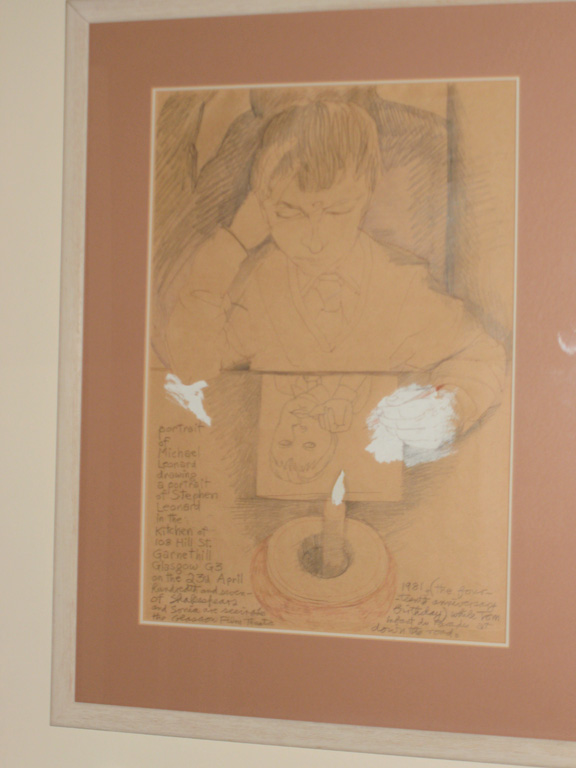
The inscription reads “Portrait of Michael Leonard drawing a portrait of Stephen Leonard in the kitchen of 108 Hill Street Garnethill Glasgow G3 on the 23rd April 1981 (the four-hundredth and seventeenth anniversary of Shakespeare’s birthday) while Tom and Sonya are seeing Les Enfants du Paradis at the Glasgow Film Theatre down the road.”
Alasdair said he would finish the portrait someday, but I like it very much the way it is and told him so. It means for me a portrait of a moment in time, and through that friendship, family, and the light of creativity.
August 2nd
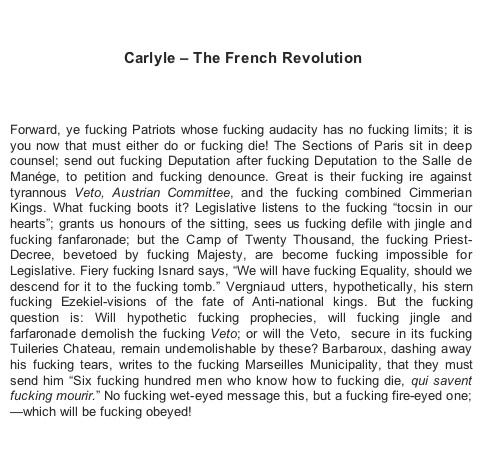
July 27th
I am presently working on a new translation of Brecht’s Mother Courage and her Children, set through its twelve scenes in time of ongoing war. This has made me tangentially interested in war landsapes. I acquired recently a set of Muirhead Bone’s The Western Front which was published in ten monthly volumes during 1916 and 1917 by authority of the War Office. Each volume includes twenty plates of Bone’s drawings with facing descriptive paragraph. The two here are from the issues for June and July 1917 and were drawn by Muirhead Bone in France. Beneath each drawing here is the descriptive paragraph that faces it in the publication.
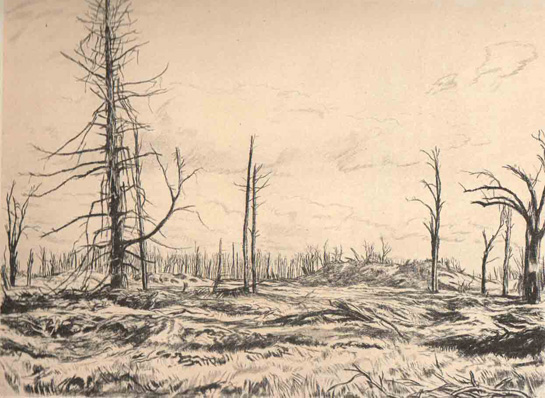
Deniecourt Chateau, Estrees The site of the chateau is marked by the large heap of ruins near the centre of the drawing. It was used for headquarters by the Germans, French and British in succession. In the space on the left of the Chateau are some German soldiers’ graves. Fastened to a tree on the right is the notice “Do not loiter here,” which is often seen in places exposed to shell fire.
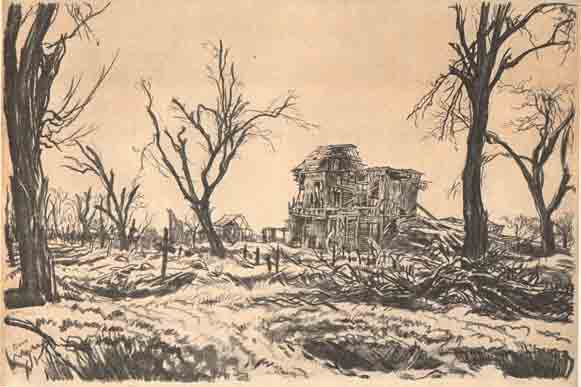
A Soldiers’ Cemetery An improvised cemetery behind a part of the front which was held by the French during the Battle of the Somme and is now held by British troops. The graves are marked by rough crosses or by the rifle or steel helmet of the dead man. Shell-fire has disturbed many of the graves. On the right of the ruined house is seen the entrance to a dug-out.
July 22nd
The ruling by the International Court of Justice that Kosovo’s 2008 declaration of independence is not illegal reminds me of the large demonstrations of protest held in Belgrade when that declaration by Kosovo was first made.
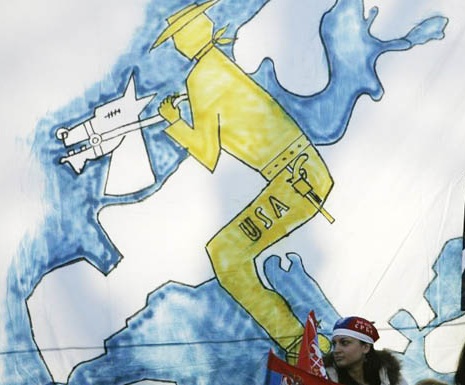
This banner held up at the demos struck my fancy then, and seems appropriate enough still now that Cameron has crawled on all fours up to the White House in the wake of his crawling Labour predecessors. Difficult to tell from the portrait whether the cowboy leading the surge is General McChrystal or General Petraeus…
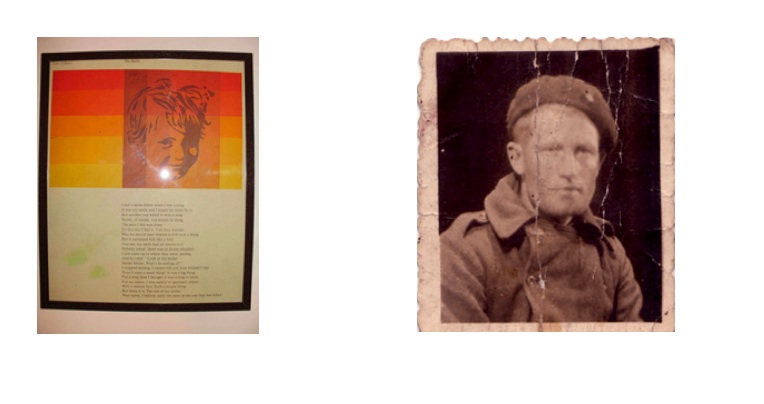
Thomas O’Brien was a socialist who fought with the International Brigade during the Spanish Civil War. The picture above right shows him thus in 1936. He wrote poetry and plays, and his life and work is commemorated by the German socialist literary historian H Gustav Klaus, whose book Strong Words, Brave Deeds O’Brien Press itself brought out in 1994.
He was a good writer, as one of his most sensitive poems, “The Smile”, bears out. It was made into a screen print by his daughter Deborah.

The Karajan Sibelius 4th recorded in the 1960’s with the Berlin Philharmonic has long been one of my favourite performances of that work. I still have it on LP. Sibelius said of Karajan’s Sibelius performances with the Philharmonia in the fifties that Karajan was the only conductor who knew what he meant. This especially of the Fourth Symphony: the Finnish author of the five-volume Sibelius biography later inscribed a copy to Karajan as to the only person who knew how to conduct Sibelius’s Fourth.
A few years ago I visited Uppingham School in Rutland to talk about my poetry in the morning and give a public reading with John Cooper Clarke in the evening. In the afternoon I went for a walk round about, and dropped in to have a look at a gallery, the Goldmark, that I found in the main village street. I don’t buy paintings or prints normally, and just wanted a look round as much to kill time as anything else.
On the floor of the gallery in the corner lay some large large prints unframed and newly unwrapped. They turned out, to my excitement, to be a series of etchings “Shipbuilding on the Clyde” by Muirhead Bone from 1917. I used up my fee for the two readings on two of the prints.
I’ve always liked Bone’s work. A graduate of Glasgow Art School, he became the UK official war artist during the first world war. More later on some of his work from that period. Here’s the two prints bought in Uppingham, about shipbuilding in Greenock. Excuse the plant frond top right of the wooden scaffold in the bottom picture, I got fed up trying to get a proper photo with my new camera.
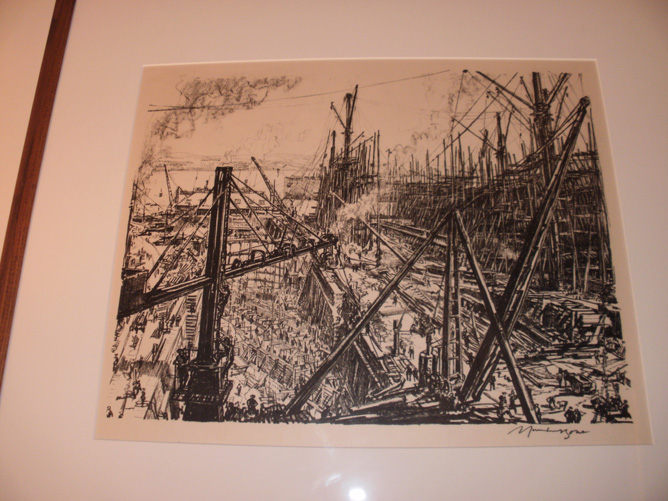
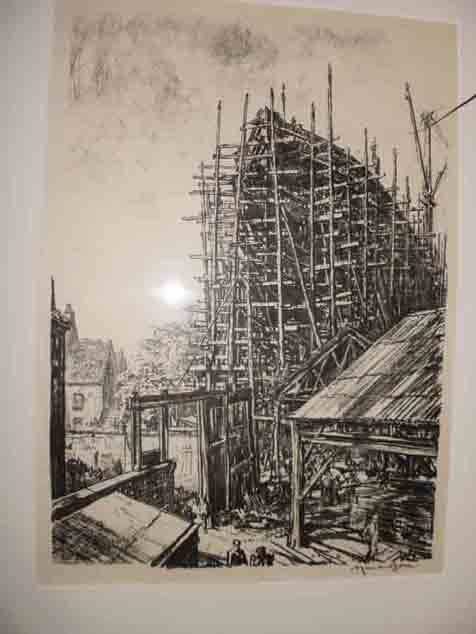
For UK television viewers Al Jazeera English news channel is now available on Freeview Channel 89 from 6pm to 11pm every evening, as from July 1st.
It’s far from being the revelatory alternative to western news it was in its early days before Uncle Sam put the heavy squeeze on its state funders and got them to screw the nut or else—we don’t want to excite anger on the Arab streets about what’s actually happening do we. So safe old UK broadcasting farts like the reverend David Frost and various ex-ITV grandees were quickly shipped in to take over a revamped current affairs.
That said, it’s still a place to find news you won’t get on BBC or CNN. Its core audience is different, and though watered down from its early days you can still find news giving a different perspective by a number of reporters who do not have the routinely Nato/Israel right-or-wrong viewpoint of the American and UK broadcasting corporates.
-------

